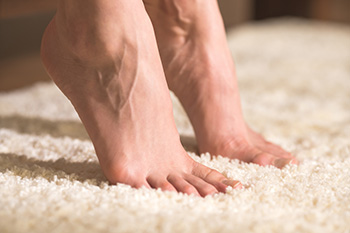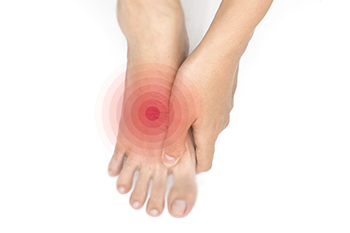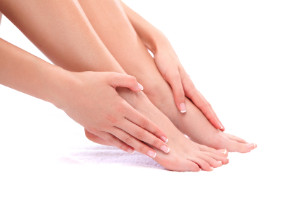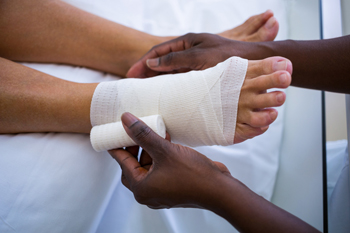

Many people incorporate appropriate leg exercises into their running regime, but may neglect their feet. The feet are the foundation of the body and provide balance and mobility for everyday activities. It is important for the feet to maintain strength, and this can be helpful in preventing painful injuries. Weak foot muscles may affect the arch and can result in plantar fasciitis, which causes severe pain and discomfort. Popular foot strengthening exercises consist of picking up marbles or curling a towel with the toes. These exercises can benefit both local and global muscles, and may lead to having a pain-free running experience. Many runners perform what is referred to as the short foot exercise. This is done by sitting in a chair with their feet on the floor, while bringing the ball of the foot toward the heel. It is important to refrain from crunching the toes, and this may help to shorten the specific muscles and ultimately strengthen the arch. If you would like more information about the importance of exercising the feet, it is suggested to visit a podiatrist.
Exercising your feet regularly with the proper foot wear is a great way to prevent injuries and build strength. If you have any concerns about your feet, contact one of our podiatrists from Grand Blanc Family Footcare. Our doctors can provide the care you need to keep you pain-free and on your feet.
Exercise for Your Feet
Exercise for your feet can help you gain strength, mobility and flexibility in your feet. They say that strengthening your feet can be just as rewarding as strengthening another part of the body. Your feet are very important, and we often forget about them in our daily tasks. But it is because of our feet that are we able to get going and do what we need to. For those of us fortunate enough to not have any foot problems, it is an important gesture to take care of them to ensure good health in the long run.
Some foot health exercises can include ankle pumps, tip-toeing, toe rises, lifting off the floor doing reps and sets, and flexing the toes. It is best to speak with Our doctors to determine an appropriate regimen for your needs. Everyone’s needs and bodies are different, and the activities required to maintain strength in the feet vary from individual to individual.
Once you get into a routine of doing regular exercise, you may notice a difference in your feet and how strong they may become.
If you have any questions please feel free to contact our office located in Grand Blanc, MI . We offer the newest diagnostic and treatment technologies for all your foot and ankle needs.

One of the most important things diabetic patients can do is examine their feet daily. Inspect the feet even when they feel fine to determine if any cuts may have developed. Neuropathy, or nerve damage, is the inability to feel any sores on the feet and this condition often accompanies diabetes. It can become a serious complication for people with diabetes if a cut is left unnoticed, therefore untreated. A small wound on the foot may become infected, leading to a diabetic foot ulcer. A good diabetic foot care routine can begin with washing and drying the feet thoroughly, followed by inspecting the soles. It is important to refrain from walking barefoot, and it can help to wear socks and shoes that fit correctly. If you have diabetes, it is strongly suggested that you are under the care of a podiatrist who can help you to manage this condition.
Diabetic foot care is important in preventing foot ailments such as ulcers. If you are suffering from diabetes or have any other concerns about your feet, contact one of our podiatrists from Grand Blanc Family Footcare. Our doctors can provide the care you need to keep you pain-free and on your feet.
Diabetic Foot Care
Diabetes affects millions of people every year. The condition can damage blood vessels in many parts of the body, especially the feet. Because of this, taking care of your feet is essential if you have diabetes, and having a podiatrist help monitor your foot health is highly recommended.
The Importance of Caring for Your Feet
Patients with diabetes should have their doctor monitor their blood levels, as blood sugar levels play such a huge role in diabetic care. Monitoring these levels on a regular basis is highly advised.
It is always best to inform your healthcare professional of any concerns you may have regarding your feet, especially for diabetic patients. Early treatment and routine foot examinations are keys to maintaining proper health, especially because severe complications can arise if proper treatment is not applied.
If you have any questions please feel free to contact our office located in Grand Blanc, MI . We offer the newest diagnostic and treatment technologies for all your foot and ankle needs.

Erythromelalgia, or EM, can affect the feet. It is considered to be a rare foot condition, and common symptoms are redness, burning, and the skin can feel warm. There are two categories of erythromelalgia, consisting of primary and secondary. The former type may be associated with family history and can be more prevalent among children. The above symptoms can become debilitating and will generally affect both feet. The latter classification may be linked to autoimmune diseases or conditions that affect the blood and bone marrow and can be more common among adults. Research has shown that erythromelalgia may be linked to heavy metal poisoning, which may happen if exposed to air or water pollution, lead-based paints, or specific types of medication. There is no cure for this foot condition, but relief may be found by treating the symptoms. This can include taking aspirin, antihistamines, or other kinds of medicine. If you have symptoms of EM, it is strongly suggested that you are under the care of a podiatrist who can help offer relief options that are correct for you.
Some foot conditions may require additional professional care. If you have any concerns, contact one of our podiatrists of Grand Blanc Family Footcare. Our doctors can provide the care you need to keep you pain-free and on your feet.
Rare Foot Conditions
The majority of foot conditions are common and can be treated by a podiatrist. Standard diagnostic procedures are generally used to identify specific conditions and treatment can be rendered. A podiatrist also treats rare foot conditions which can be difficult to diagnose and may need extra attention and care.
There are many rare foot conditions that can affect children. Some of these can include:
Freiberg’s disease - This can be seen as a deterioration and flattening of a metatarsal bone that exists in the ball of the foot. It typically affects pre-teen and teenage girls, but can affect anyone at any age. Symptoms that can accompany this can be swelling, stiffness, and the patient may limp.
Kohler’s disease - This often targets the bone in the arch of the foot and affects younger boys. It can lead to an interruption of the blood supply which ultimately can lead to bone deterioration. The patient may limp or experience tenderness, swelling, and redness.
Maffucci syndrome - This affects the long bones in a child’s foot leading to the development of abnormal bone lesions. They are benign growths and typically develop in early childhood and the bones may be susceptible to breaking.
A podiatrist can properly diagnose and treat all types of rare foot conditions. If your child is affected by any of these symptoms or conditions, please don’t hesitate to call our office so the correct treatment method can begin.
If you have any questions please feel free to contact our office located in Grand Blanc, MI . We offer the newest diagnostic tools and technology to treat your foot and ankle needs.

Puncture wounds on the feet are caused by injuries to the feet from pointed objects. Such wounds are usually caused by stepping on a sharp object, such as a nail or piece of glass. Penetration is usually deeper if it is on a weight-bearing area of the foot. An infection can quickly develop from such a wound and must be tended to in a timely manner. If you have sustained a puncture wound, the first thing to do is wash your hands and examine the wound to see how deep it is. If the object grazed the skin and it was not rusty or dirty, the scratch should be gently cleaned with soap and water. A minor wound can then be covered with a bandage and checked frequently. If it is deeper, the object is still in the foot, or dirt from the pointed object has entered the wound, it is important to seek treatment immediately. It is suggested that if you have sustained such an injury, you make an appointment with a podiatrist as soon as possible to have the wound checked, tetanus shots updated, and treatment given.
Wound care is an important part in dealing with diabetes. If you have diabetes and a foot wound or would like more information about wound care for diabetics, consult with one of our podiatrists from Grand Blanc Family Footcare. Our doctors will assess your condition and provide you with quality foot and ankle treatment.
What Is Wound Care?
Wound care is the practice of taking proper care of a wound. This can range from the smallest to the largest of wounds. While everyone can benefit from proper wound care, it is much more important for diabetics. Diabetics often suffer from poor blood circulation which causes wounds to heal much slower than they would in a non-diabetic.
What Is the Importance of Wound Care?
While it may not seem apparent with small ulcers on the foot, for diabetics, any size ulcer can become infected. Diabetics often also suffer from neuropathy, or nerve loss. This means they might not even feel when they have an ulcer on their foot. If the wound becomes severely infected, amputation may be necessary. Therefore, it is of the upmost importance to properly care for any and all foot wounds.
How to Care for Wounds
The best way to care for foot wounds is to prevent them. For diabetics, this means daily inspections of the feet for any signs of abnormalities or ulcers. It is also recommended to see a podiatrist several times a year for a foot inspection. If you do have an ulcer, run the wound under water to clear dirt from the wound; then apply antibiotic ointment to the wound and cover with a bandage. Bandages should be changed daily and keeping pressure off the wound is smart. It is advised to see a podiatrist, who can keep an eye on it.
If you have any questions, please feel free to contact our office located in Grand Blanc, MI . We offer the newest diagnostic and treatment technologies for all your foot care needs.